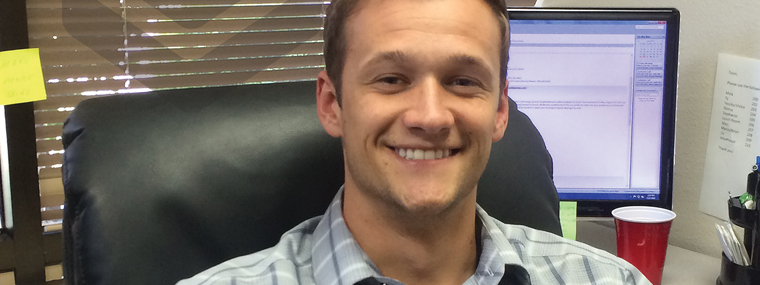
The ‘Net’ Generation: Working with Millennials in the Pressure Washing Industry, Part Two
By Terri Perrin / Published September 2016

Editor’s Note: Working with Millennials in the Pressure Washing Industry, Part One appeared in the August 2016 issue. To read it, please visit pubs.royle.com/publication/?i=321964.
While it is not uncommon for baby boomers to criticize the work ethics of millennials, we have to recognize that the frustrations go both ways. It’s called a ‘generation gap,’ and it has been around for, let’s face it, generations!
In many ways, Connor Eubanks could be labeled as a typical, well-educated millennial. The 24-year-old Californian finished high school and attended university, earning a degree in managerial organizational communication with an emphasis in business management, but he doesn’t fit the stereotypical image of how some people view the ‘Net Generation.’ He’s not unfocused, self-centered, nor suffering from ‘affluenza.’ He is a hardworking and dedicated individual who started working part-time in the family business—South Shore Building Services Inc.—while still in high school, working every summer and on school breaks. He gained the respect of the crew and learned about the company from the ground up before he applied for an entry-level position and joined the company full-time.
“We face the baby boomer to millennial generation gap at South Shore on a daily basis,” explains Eubanks. “However, we make an effort to reduce this tension and remain productive with our communications. My parents, Ty and Vickie, have owned South Shore Building Services for 37 years. My brother, Tanner, and I grew up working alongside other employees, learning the industry by doing the pressure washing and window cleaning. Tanner now runs our operations, while I oversee the business development and sales division. We can’t wait to make our mark as millennials to make our generation and the baby boomers before us proud.”
When asked what it is like to be a millennial, Eubanks has some strong opinions. “Being a millennial can be intimidating at times,” says Eubanks. “The economy has changed so much from the 1970s to present day. Student debt is at an all-time high, leading to college graduates facing five to ten years of student loan payments and overwhelming rent rates. It is a real struggle to compete for job opportunities. In 2012, it was reported that half the graduate class was either unemployed or underemployed. The millennial generation has been ill prepared for the future economy. However, this generation also has motivational drive and self-awareness that can lead to great rewards. Although it might take us more time to settle in, we are knocking on the door to success.”
“Millennials want to be in an industry and a job that has the potential for growth,” believes Scott Horsley (age 34), vice president of Scotts Pressure Wash in Calgary, Alberta. “We thrive with constant development of new technology to streamline operations and administration, and we especially love technology related to the environment. It excites me personally to have the ability
to develop environmental stewardship programs and build corporate pride in my team.
“Working with multi-generations brings many ideas and opinions to the table, and it can be challenging to sort through,” explains Horsley. “For myself, I always ask, ‘What’s the right decision for the company?’ All employees, regardless of their generation, should be encouraged to share their opinions. That’s teamwork, but you can’t lose respect. I was brought up working alongside
the older generation. I was taught to respect my elders and the idea of corporate hierarchy. That’s not always understood or accepted in today’s workplace.”
 Lack of respect is something that frustrates baby boomer Roy Chappell, president of Chappell Supply in Oklahoma City, OK. “One of the most common things I see in the workplace is that millennials, in general, have entitled attitudes and short attention spans,” remarks Chappell. “For example, many of them have a bad habit of spending a lot of time on their phones, doing things that don’t pertain to business. It’s a waste of time. They also say, ‘I have a college degree, and I should be making $100,000 a year!’ What they don’t seem to understand is that in order to earn that, they have to perform $150,000 worth of work. It costs money to run a company, and no one will pay you what you think your worth is if you waste time on the phone and spend too much time socializing with co-workers.”
Lack of respect is something that frustrates baby boomer Roy Chappell, president of Chappell Supply in Oklahoma City, OK. “One of the most common things I see in the workplace is that millennials, in general, have entitled attitudes and short attention spans,” remarks Chappell. “For example, many of them have a bad habit of spending a lot of time on their phones, doing things that don’t pertain to business. It’s a waste of time. They also say, ‘I have a college degree, and I should be making $100,000 a year!’ What they don’t seem to understand is that in order to earn that, they have to perform $150,000 worth of work. It costs money to run a company, and no one will pay you what you think your worth is if you waste time on the phone and spend too much time socializing with co-workers.”
If having an unjustified sense of entitlement is a common character trait with Generation Y, it begs the question, who is to blame? “I think it is how they were brought up,” declares Chappell. “We have pampered this next generation too much. Unfortu-nately, I think there is going to be a lot of disappointment in the lives of the millennial generation. The pay raises and promotions won’t come across as fast as they think they should. They have to realize that you have to earn your way, to put in the time and effort, but I also believe they will accomplish great things in the long term because they are a very goal-orientated generation. They will eventually get there.”
“I believe that our generation, as a whole, has a sense of entitlement because many were raised by ‘helicopter parents,’” says Eubanks. “They obsessively hovered over their children and continue to advocate for them as adults. It strips away a sense of accountability and self-motivation. This shows in the increasing number of college graduates not able to secure jobs and who live with their parents to make ends meet. The system failed the millennial generation. We were encouraged to complete high school and go to college but were not educated about the realities of present-day financial responsibilities.
“Our generation suffers because we spent hundreds of thousands in schooling to prepare us for financial success only to face the world of bills, taxes, 401ks, life insurance, retirement planning, and a lack of affordable housing in the most expensive economy yet,” laments Eubanks.
He also feels that millennials may be perceived as selfish due to their obsession with trends and social media, a need to be free from societal norms, and desire for self-expression. Baby boomers are more regimented, stricter in their ways, and more often willing to adapt their social, career, and economic lives to meet the oncoming generation and ever-changing technology.
“This generation likes to have the ability to put our spin on the business and bring it to the next level,” concludes Horsley. “It can be frustrating when there are no opportunities to contribute. We give and want the most from our jobs and see them as extensions of ourselves. For millennials, work is not just a career or a job. Perhaps it is better described as a journey.”
For some, however, that journey is fraught with twists and turns. Some millennials change jobs frequently. They get bored quickly and look to greener pastures for the next best thing. As a business owner, Horsley admits that it can be exasperating to work with people who are always looking for better opportunities. He is now seeing a positive shift. Employees are starting to stay longer than in the past. Maybe the millennials are growing up and growing roots? Who knows? The bottom line is that people have to be happy doing what they are doing with their job and in life or they will move along—regardless of their age. It is up to the employer to learn what makes their millennials tick and work to fulfill that need.
“My challenges working with baby boomers are minimal,” concludes Eubanks. “That said, I do feel that their generation is stuck in a biased mindset. Millennials are different. If baby boomers remain in a place of bias, our generation could be led to drastic financial consequences. Opportunity is everything, and opportunity must be equal. Not every millennial is the same.”





